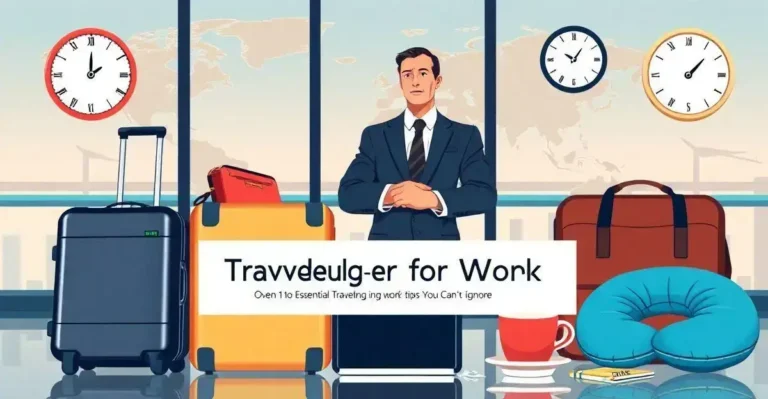Traveling for work tips are crucial for professionals who find themselves constantly on the move. By mastering certain strategies, you can transform your work trips into productive and enjoyable experiences.
Planning ahead, staying organized, and prioritizing your well-being are just a few of the elements that can enhance your business travel.
Packing Essentials for Business Travel
Packing essentials for business travel requires careful planning to ensure you have everything you need without overpacking. Start by making a checklist of items that you will require for meetings and events.
Clothing should be professional and versatile; consider packing a few mix-and-match pieces that can be styled differently. Don’t forget to include a blazer and comfortable shoes for those long days.
Always pack a toiletries kit that includes travel-sized bottles of shampoo, conditioner, and other personal care items. This will save you time when you arrive at your destination.
In addition to clothing, it’s important to include technology essentials such as a laptop, phone charger, and any necessary adapters. Keeping your devices charged will enable you to stay productive while on the go.
Consider bringing noise-canceling headphones if you often find yourself working in busy environments. Also, make sure to have a travel organizer for your cables and accessories; this will help keep your bag tidy.
Finally, don’t forget to pack any important documents or work materials, whether in digital form or printed. Using cloud storage can help you access everything you need from anywhere, but it’s wise to have backups just in case.
Packing these essentials smartly not only makes your journey smoother but also enhances your overall productivity during business trips.
Maximizing Your Time on the Road

Maximizing your time on the road is crucial for business travelers. One big tip is to plan your travel schedule carefully. Always try to book direct flights to save time at the airport. If you must make a connection, leave plenty of time to switch planes. Once you arrive, prioritize your meetings and tasks, focusing on what’s most important first. This ensures that you are productive right away.
Another smart idea is to use travel time wisely. Consider bringing your laptop or tablet to catch up on work during flights or waiting times. You can also use apps to stay organized and keep your agenda on track. By mapping out your day, you can identify free moments for quick email responses or planning sessions.
Additionally, staying in hotels that offer business amenities like free Wi-Fi and meeting rooms can also help you remain efficient. This way, you don’t have to rush back to a central location to complete your tasks.
Finally, remember to take breaks to recharge. Quick walks or short stretches can help refresh your mind, so you can stay focused and energized throughout your trip.
How to Stay Productive While Traveling
Staying productive while traveling is essential for business success. First, create a clear agenda before your trip. List all meetings, deadlines, and tasks that need to be completed. This helps you stay focused.
During travel, use time blocks effectively. Set aside periods for specific tasks, like emails or project work, to maintain productivity.
Instead of being overwhelmed, use travel time wisely. Consider listening to audio books or podcasts that are relevant to your work. This way, you can learn while commuting.
Additionally, remember to leverage technology. Take advantage of project management apps to keep track of tasks and deadlines. These tools can help you stay organized wherever you are.
Also, maintain a healthy routine. Make time for exercise, even if it’s just a quick walk. Movement helps clear your mind and boosts productivity.
Lastly, ensure that you stay connected. Use video calls or messaging apps to keep in touch with your team. This fosters collaboration and keeps everyone on the same page despite being miles apart.
Navigating Airports Like a Pro

Navigating airports like a pro can make your travel experience smoother and less stressful. First, familiarize yourself with the airport layout before your trip. Most airports have maps online that show terminals, gates, and amenities. This can help you plan your route and avoid unnecessary rushing.
When you arrive, check the arrival boards for your flight status right away. This will inform you of any delays or gate changes. Arriving early is beneficial, as it gives you time to go through security without a rush. Remember to follow the TSA guidelines to speed up the screening process.
Additionally, use mobile boarding passes whenever possible. They are convenient and can save time at the boarding gate. If you are in a busy airport, consider enrolling in expedited security programs like TSA PreCheck or Global Entry. These programs allow you to breeze through screening with fewer hassles.
While waiting for your flight, take advantage of the airport amenities. Many airports offer lounges where you can relax, enjoy complimentary snacks, and access free Wi-Fi. This can be a great way to stay productive while waiting. Finally, keep your essentials in a carry-on bag. This way, you have everything you need easily accessible, ensuring a seamless travel experience.
Maintaining Work-Life Balance on Business Trips
Maintaining work-life balance on business trips is important for mental and physical health. To start, set clear boundaries for work and personal time. Make a schedule that lists your meetings and tasks, but also includes time for leisure activities or relaxation. Communicating with your team about your availability can also help everyone manage expectations.
When traveling, consider staying in hotels that offer good facilities for relaxation, such as a gym or spa. This will give you a chance to unwind after a long day of meetings.Exercising can significantly reduce stress and improve your mood. Additionally, taking breaks during your day to enjoy local attractions or cuisine can also enhance your overall experience.
Try to maintain a consistent sleep schedule, even when in different time zones. Good sleep helps you stay refreshed and focused. Use apps that can help track your sleep and remind you to take breaks throughout the day.
Finally, when possible, incorporate family or friends into your trips. This can turn work travels into mini-vacations, allowing for quality time while also completing necessary work tasks.
Health Tips for Frequent Business Travelers

Health tips for frequent business travelers are essential for maintaining well-being on the go. First, prioritize hydration. Airports and flights can be dry; drink plenty of water before and during travel to stay refreshed. Bring a reusable water bottle to make this easier.
Eating well is also crucial. Pack healthy snacks like nuts or dried fruit to avoid unhealthy airport food. This keeps your energy levels stable during busy days.
Incorporating exercise into your travel routine is important too. Look for hotels with gyms or find local parks for a quick workout. Even short walks can help clear your mind and boost your mood. Stretching during long flights or waits can prevent stiffness and improve circulation.
Don’t forget to get enough sleep! Adjust your sleep schedule ahead of time if crossing time zones. Use sleep masks and earplugs to enhance rest during flights or in noisy hotels.
Lastly, consider mental well-being. Take time to relax and unwind. Meditation or reading can help reduce stress and improve focus. Traveling for work can be demanding, but with these tips, you can stay healthy and balanced on the road.
Budgeting for Work Travel Expenses
Budgeting for work travel expenses is key to ensuring your trip is cost-effective. Start by estimating your overall costs, such as flights, accommodation, meals, and transport. Use apps or spreadsheets to keep track of expenses in real-time. This helps avoid overspending.
Setting a daily budget can also be useful. Allocate specific amounts for meals, transportation, and activities. This makes it easier to manage your funds and adjust your spending if needed.
When booking flights and hotels, look for deals online. Websites and apps often offer discounted rates for business travelers. Consider using loyalty programs for additional savings. If you frequently travel to the same locations, staying with the same hotel chain can earn you benefits such as free nights or upgrades.
Also, don’t forget about meal reimbursements. If your company covers meals, keep receipts and ensure you meet any guidelines they have in place. Similarly, document any other reimbursable expenses, like transportation or conference fees. Being organized will help during the reimbursement process.
Lastly, always have a buffer in your budget for unexpected expenses. This can cover emergencies or last-minute changes. By planning thoroughly, you can make the most out of your work travel experience without breaking the bank.
FAQ – Frequently Asked Questions about Business Travel
What are essential items to pack for business travel?
Key items include business attire, technology devices, toiletries, and healthy snacks to keep you organized and prepared.
How can I maximize productivity while traveling?
Plan your schedule in advance, use travel time effectively, and set aside specific time blocks for work tasks.
What strategies can help maintain work-life balance during trips?
Set boundaries for work hours, incorporate leisure activities, and communicate your availability with your team.
How can I stay healthy while on business trips?
Stay hydrated, exercise regularly, and prioritize sleep to improve your physical and mental well-being.
What are effective ways to budget for work travel expenses?
Estimate your total costs, track your expenses in real-time, and have a buffer for unexpected costs.
How should I navigate airports efficiently?
Familiarize yourself with airport layouts, use mobile boarding passes, and consider expedited security programs.
